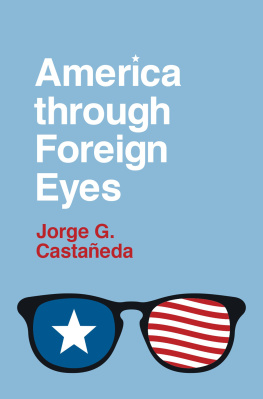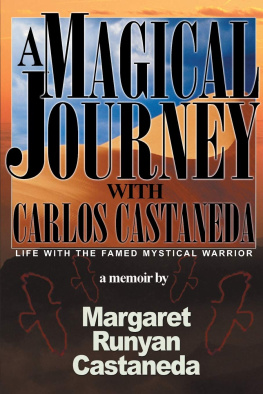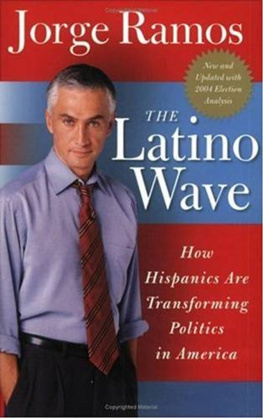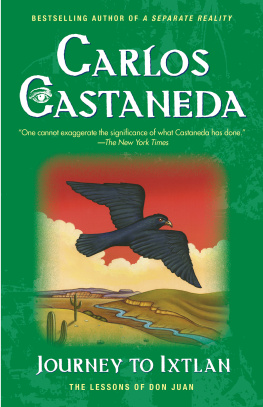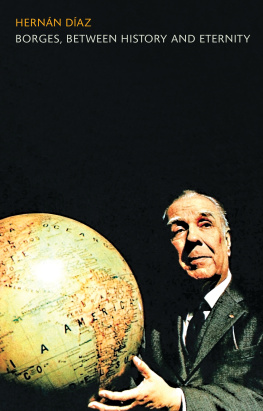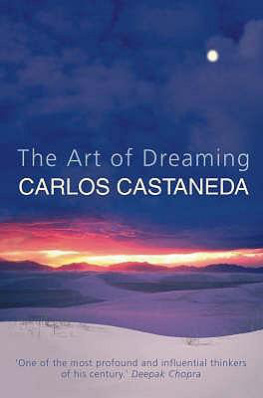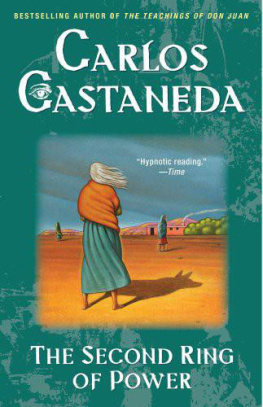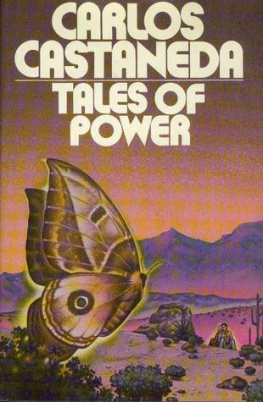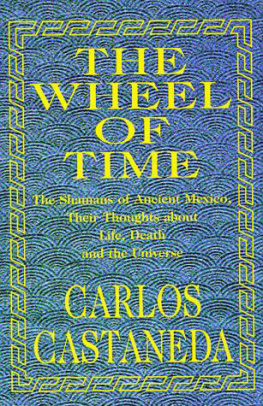Jorge G. Castañeda - America through Foreign Eyes
Here you can read online Jorge G. Castañeda - America through Foreign Eyes full text of the book (entire story) in english for free. Download pdf and epub, get meaning, cover and reviews about this ebook. year: 2020, publisher: Oxford University Press, genre: Politics. Description of the work, (preface) as well as reviews are available. Best literature library LitArk.com created for fans of good reading and offers a wide selection of genres:
Romance novel
Science fiction
Adventure
Detective
Science
History
Home and family
Prose
Art
Politics
Computer
Non-fiction
Religion
Business
Children
Humor
Choose a favorite category and find really read worthwhile books. Enjoy immersion in the world of imagination, feel the emotions of the characters or learn something new for yourself, make an fascinating discovery.
- Book:America through Foreign Eyes
- Author:
- Publisher:Oxford University Press
- Genre:
- Year:2020
- Rating:3 / 5
- Favourites:Add to favourites
- Your mark:
- 60
- 1
- 2
- 3
- 4
- 5
America through Foreign Eyes: summary, description and annotation
We offer to read an annotation, description, summary or preface (depends on what the author of the book "America through Foreign Eyes" wrote himself). If you haven't found the necessary information about the book — write in the comments, we will try to find it.
America through Foreign Eyes — read online for free the complete book (whole text) full work
Below is the text of the book, divided by pages. System saving the place of the last page read, allows you to conveniently read the book "America through Foreign Eyes" online for free, without having to search again every time where you left off. Put a bookmark, and you can go to the page where you finished reading at any time.
Font size:
Interval:
Bookmark:



Oxford University Press is a department of the University of Oxford. It furthers the Universitys objective of excellence in research, scholarship, and education by publishing worldwide. Oxford is a registered trade mark of Oxford University Press in the UK and certain other countries.
Published in the United States of America by Oxford University Press
198 Madison Avenue, New York, NY 10016, United States of America.
Oxford University Press 2020
All rights reserved. No part of this publication may be reproduced, stored in a retrieval system, or transmitted, in any form or by any means, without the prior permission in writing of Oxford University Press, or as expressly permitted by law, by license, or under terms agreed with the appropriate reproduction rights organization. Inquiries concerning reproduction outside the scope of the above should be sent to the Rights Department, Oxford University Press, at the address above.
You must not circulate this work in any other form and you must impose this same condition on any acquirer.
Library of Congress Cataloging-in-Publication Data
Names: Castaneda, Jorge G., 1953 author.
Title: America through foreign eyes / Jorge G. Castaneda.
Description: New York, NY : Oxford University Press, 2020. | Includes index.
Identifiers: LCCN 2019044724 (print) | LCCN 2019044725 (ebook) |
ISBN 9780190224493 (hardback) | ISBN 9780190224516 (epub)
Subjects: LCSH: ExceptionalismUnited States. | National characteristics,
American. | United StatesForeign public opinion. |
United StatesPolitics and government. | United StatesSocial conditions.
Classification: LCC E895.C38 2020 (print) | LCC E895 (ebook) |
DDC 973dc23
LC record available at https://lccn.loc.gov/2019044724
LC ebook record available at https://lccn.loc.gov/2019044725


I am deeply grateful to the many friends and family members who contributed to making this long-desired endeavor come to fruition. Firstly, to Alejandra Zerecero, my friend and co-worker, whose research, editing, organization, fact-finding and -checking, and overall management of this book were invaluable. To Daniela Silva, who worked tirelessly with Alejandra and myself on these same challenges, mainly on research and fact-checking, I am also greatly indebted.
Alan Riding, whose 1985 book about the Mexicans served as an inspiration and model for this one, not only read the manuscript twice, but edited it thoroughly and suggested detailed improvements for several sections. My thanks, once again. My son, Jorge Andrs, my brother Andrs, and my sister Marina all plowed through various versions of the final draft; their comments, suggestions, critiques, and encouragement were priceless. John Coatsworth, Ken Roth, Jose Luis Alberro, Dudley Ankerson, and Sheerly Avni also read the entire text, suggested improvements, detected confusion or mistakes, and provided encouragement. My thanks for taking the time from a hectic schedule to do this. Rebecca Bill Chvez, Krissie Dahr, Alan Tonelson, and Daniel Wilkinson read parts of the text early on, and were especially helpful in starting me off on the right track.
Lastly, I owe a great deal to David McBride, my editor at OUP, who believed in this project from the very beginning, waited patiently for it to get underway, and then acted even more patiently in dealing with my constant pestering and stubbornness, in addition, of course, to carrying out the best possible job of editing. My thanks for all this effort.
Foreigners have been writing about the United States ever since its foundation. Now it is my turn. But please dont hold this against me: the United States itself is at fault. Like a great many people on earth, Ive long been fascinated by this remarkable phenomenon which calls itself America. My fateor perhaps good fortunehas been that of a foreigner who for half a century lived the American experienceas a child, as a student, as an author, as a recurrent visitor, and as a university professor. Being Mexican places me in a special category: having lost half its territory to the United States in the nineteenth century, having found itself caught up in the maelstrom of Americas current identity crisis, Mexico can never ignore what happens north of the border. Further, while serving as Mexicos foreign minister from 2000 to 2003, I had the privilege of peeping inside the machinery of power that makes this great nation tick.
That said, this book is not written from a Mexican perspective but rather from that of a sympathetic foreign critic who has seen the United States from both inside and outside. And its hope is to contribute something to how Americans view themselves and are viewed by the world.
Before embarking on this journey, I naturally looked back at some of my forebears, earlier foreigners who were drawn to visit or live in the United States and who then went on to offer their version of America to their home readers. Some like the French traveler Alexis de Tocqueville, author of the early nineteenth-century classic, Democracy in America, felt European nations had much to learn from the American democratic experiment. Others like Charles Dickens left dismayed by what he considered to be the countrys singular obsession with money. But they are just two of dozens who have triedand continue to tryto find a magic key that unlocks the complexities and contradictions of American society. Indeed, it is as if the United States seeks to challenge foreign writers to explain it, confident they will fail. And in taking it on, these outsiders have variously experienced frustration, hope, anger, excitement, disappointment, and enlightenmentbut never indifference.
I have varied my references to previous authors by country and language, but they are inevitably concentrated in Western Europe and to a lesser extent Latin America. These are the regions I am most familiar with, as well as where most of this type of writing was rooted. There are fewer references to Asian and African sources; the explanation lies in my own ignorance of their work. Perusing more carefully what Japanese and Chinese travelers concluded about America might be especially valuable, for example.
In the early nineteenth century, many European travelers struggled to come to terms with the land of the free where slavery was entrenched. The English writer and poet Rudyard Kipling was one who simply disliked Americans from the moment he landed in San Francisco. In the late nineteenth century, the Cuban poet and revolutionary Jos Mart, who spent fourteen years in exile in the United States, was fascinated with the American work ethic and prosperity but also deeply depressed over his hosts obsession with money and the imminent conquest of his homeland. In 1906, Werner Sombart, a German sociologist, was puzzled why there was no socialism in the United States. Later, the German novelist Thomas Mann and the French philosopher Jean-Paul Sartre fell in love with the United States on arrival, then either left their temporary exile in disgust or became irreparably hostile to it later. Others responded anecdotally. The Russian-born novelist Vladimir Nabokov, a long-time resident in the United States, once quipped that cars are the only place in America where there is neither noise nor air current. More unusually, the Swedish sociologist Gunnar Myrdal wrote not for other foreigners, but for Americans: his classic on race,
Font size:
Interval:
Bookmark:
Similar books «America through Foreign Eyes»
Look at similar books to America through Foreign Eyes. We have selected literature similar in name and meaning in the hope of providing readers with more options to find new, interesting, not yet read works.
Discussion, reviews of the book America through Foreign Eyes and just readers' own opinions. Leave your comments, write what you think about the work, its meaning or the main characters. Specify what exactly you liked and what you didn't like, and why you think so.

